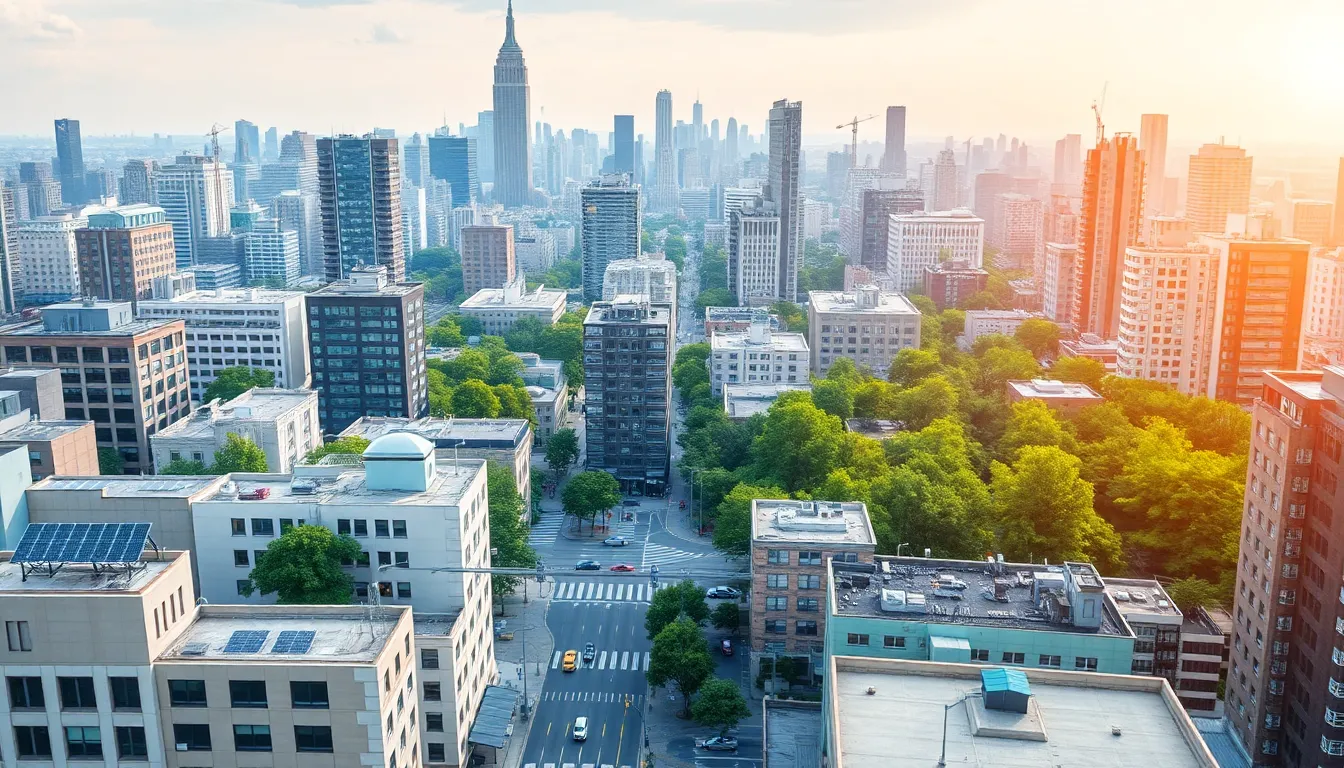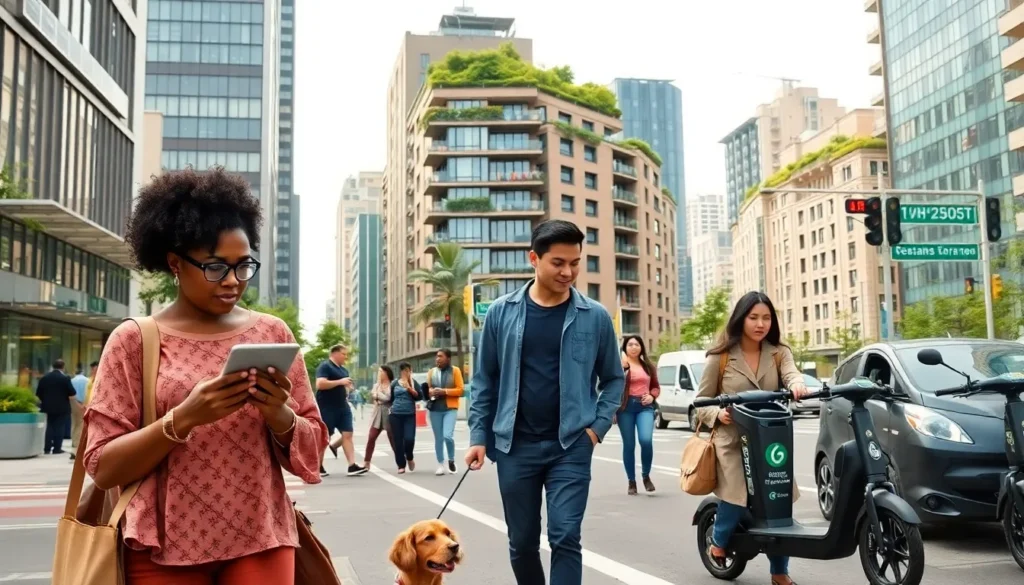Table of Contents
ToggleAs urban populations surge, cities are increasingly turning to technology to enhance livability and sustainability. Smart cities leverage innovations like IoT, AI, and big data to create efficient infrastructures that improve everything from traffic management to energy consumption. These advancements not only streamline city operations but also foster a more connected community.
In this rapidly evolving landscape, the integration of technology plays a crucial role in addressing challenges such as overcrowding, pollution, and resource management. By harnessing the power of data and connectivity, smart cities are paving the way for a more resilient future. Exploring the impact of tech in urban environments reveals the exciting potential for improved quality of life and environmental stewardship.
Overview of Tech in Smart Cities
Smart cities leverage advanced technologies to optimize urban living. With the integration of Internet of Things (IoT) devices, cities collect real-time data that enhances resource management. These systems support various applications, such as smart traffic management and waste disposal, effectively reducing congestion and improving environmental sustainability.
Artificial Intelligence (AI) plays a crucial role in processing this data. It enables predictive analytics that inform city planning decisions. For example, AI algorithms optimize energy consumption in smart grids, reducing waste and costs for residents.
Big data analytics provides insights into urban dynamics. City planners utilize this information to enhance public transport systems, ensuring timely and efficient services. Analytics also facilitates community engagement through platforms that allow residents to voice issues and propose improvements, increasing civic participation.
Connected infrastructure enhances disaster response capabilities. Smart sensors provide early warnings for events like floods or earthquakes, helping authorities implement timely interventions. Furthermore, the use of renewable energy sources in smart cities fosters environmental responsibility and reduces carbon footprints.
Overall, the application of technology in smart cities promotes efficiency, sustainability, and improved quality of life for urban populations.
Key Technologies Driving Smart Cities

Smart cities rely on several key technologies that enhance urban living and streamline operations. These innovations play vital roles in addressing urban challenges and improving the quality of life for residents.
Internet of Things (IoT)
IoT devices serve as the backbone of smart cities, enabling seamless connectivity and data collection. Sensors installed in infrastructure, transportation systems, and public services gather real-time information on traffic flow, air quality, and energy usage. This data supports smart traffic management systems that reduce congestion by optimizing signal timings. Additionally, IoT enhances waste management through smart bins that notify collection services when full, improving resource efficiency.
Artificial Intelligence (AI)
AI technology processes the vast amounts of data collected by IoT devices, enabling predictive analytics that inform decision-making. AI algorithms analyze patterns and trends to improve public services, such as optimizing energy consumption in buildings and forecasting demand in public transportation systems. With AI, cities can implement adaptive traffic systems that respond to real-time conditions, further easing congestion and improving safety for pedestrians and drivers alike.
Big Data and Analytics
Big data analytics provides urban planners with insights that drive effective decision-making and improve city operations. Analyzing large datasets allows for enhanced public transportation systems by identifying usage trends and adjusting routes accordingly. It also encourages civic engagement by providing platforms for residents to voice concerns and suggest improvements based on collected data. Through insights derived from big data, cities can prioritize investment in infrastructure projects that yield the greatest benefits to their communities.
Benefits of Implementing Tech in Smart Cities
Implementing technology in smart cities fosters enhanced efficiency, sustainability, and improved quality of life for residents. These benefits promote better urban living and address increasing urban challenges.
Enhanced Efficiency and Sustainability
Enhanced efficiency arises from utilizing smart technologies for resource management. Cities deploy IoT sensors to monitor energy usage, water consumption, and waste levels, leading to optimized operations. For example, smart meters help reduce energy wastage by providing real-time data to consumers and utilities.
Sustainability features prominently due to technology’s role in reducing emissions and conserving resources. Urban areas that utilize smart traffic systems decrease congestion and lower carbon footprints. Additionally, renewable energy integration, such as solar panels and wind turbines, supports cleaner energy consumption in local grids.
Table 1 provides examples of efficiency and sustainability gains from tech implementations in smart cities.
| Benefit | Example |
|---|---|
| Energy Efficiency | Real-time monitoring through smart meters |
| Waste Reduction | IoT sensors for efficient waste collection |
| Traffic Management | Adaptive signal controls for reduced congestion |
| Renewable Energy | Solar-powered smart streetlights |
Improved Quality of Life for Residents
Improved quality of life results from smart city initiatives aimed at enhancing public services. For example, smart public transportation systems use data analytics to provide residents with real-time updates, reducing wait times and encouraging usage.
Health services also benefit, thanks to telemedicine and health monitoring technologies. These innovations ensure residents access timely health resources, contributing to overall well-being. Enhanced safety measures, including smart surveillance systems, lead to reduced crime rates and increased public safety.
Access to green spaces benefits residents through city planning that incorporates parks and recreational areas, promoting physical and mental health. By fostering community engagement through online platforms, residents can actively participate in local governance and decision-making processes.
These enhancements collectively lead to a more satisfying urban experience, promoting a sense of community and belonging among residents.
Challenges and Considerations
Smart cities face several challenges that require careful planning and consideration, particularly in the areas of data privacy, security, and infrastructure.
Data Privacy and Security
Data privacy and security represent critical concerns in smart cities. As IoT devices collect vast amounts of personal data from residents, ensuring confidentiality becomes essential. Cities must implement robust encryption and data protection measures to prevent unauthorized access. Additionally, regulations, such as GDPR in Europe and CCPA in California, establish standards that smart cities must follow to safeguard resident information. Compliance with such regulations helps in building trust with citizens, ensuring that they feel secure in sharing necessary data with city services.
Infrastructure Limitations
Infrastructure limitations can hinder the development of smart cities. Many urban areas lack the updated physical and technological frameworks needed to support advanced smart technologies. Legacy systems often struggle to integrate with new IoT devices, leading to inefficiencies in data sharing and communication. Upgrading existing infrastructure requires substantial investment and coordinated efforts among various stakeholders, including government entities and private partners. Addressing these limitations ensures that cities can fully leverage the benefits of smart technologies, ultimately improving urban living conditions.
Future Trends in Smart City Technology
As smart cities evolve, several trends are emerging that will shape the future of urban living. Key advancements include autonomous vehicles and smart public services, which promise to enhance efficiency and improve the quality of life.
Autonomous Vehicles
Autonomous vehicles (AVs) stand to revolutionize urban transportation. AVs utilize advanced sensors, machine learning, and real-time data to navigate city streets safely. By reducing traffic congestion, they can enhance mobility and lower emissions. A study by McKinsey & Company forecasts that the widespread adoption of AVs could lead to a 90% reduction in vehicle accidents and a 60% decrease in parking demand. Cities can integrate AVs with smart traffic management systems, allowing for optimized traffic flow and reduced travel times. This integration supports public transit systems, enhancing last-mile connectivity and promoting sustainable urban transport solutions.
Smart Public Services
Smart public services enhance urban living through innovative technology solutions. Cities can implement smart grids that optimize energy distribution, minimizing outages and improving energy efficiency. For example, smart water management systems utilize IoT sensors to monitor water quality and consumption in real-time, identifying leaks and reducing waste. Integrating telehealth services allows residents to access medical care more efficiently, increasing healthcare access while decreasing emergency room congestion. Moreover, smart waste management technologies track waste levels and optimize collection routes, resulting in lower operational costs and decreased environmental impact. Overall, these advancements in public services foster a more engaging and responsive urban environment.
The evolution of smart cities marks a significant shift in urban living. By harnessing the power of technology, cities can address pressing challenges while enhancing the quality of life for residents. As innovations like IoT, AI, and big data continue to develop, they will play a crucial role in shaping sustainable and efficient urban environments.
However, the journey toward fully realized smart cities requires careful consideration of data privacy and infrastructure needs. With the right investments and collaborative efforts, cities can unlock the full potential of these technologies, fostering safer, more connected, and environmentally responsible communities. The future of urban living looks promising, paving the way for a more sustainable and engaging city experience.





